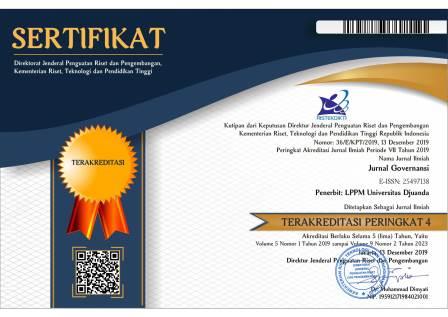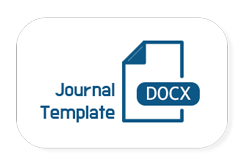UNVEILING IMPLEMENTATION AND IMPACT OF NEO-WEBERIAN STATE MODEL IN THE INTERNATIONAL BUREAUCRATIC REVOLUTION
DOI:
https://doi.org/10.30997/jgs.v10i2.14351Keywords:
Global Bureaucratic Reform, Neo Weberian State (NWS), Public Service PerformanceAbstract
This research uses a literature review (SLR) study to investigate the application of the Neo-Weberian State (NWS) model in global bureaucratic reform, with an emphasis on economic, social and health issues. This research aims to provide a comprehensive understanding of the implementation of NWS, critically evaluate its success and provide recommendations for developing government governance and community services. This research applies a five-stage approach by Transfield to review the literature on the implementation of the Neo-Weberian State (NWS) over the past few decades. This review combines results from qualitative and quantitative research that has been published between 2021-2024 in various European countries. The results show that the Neo Weberian State (NWS) can increase efficiency in public services and overcome global challenges, despite facing internal obstacles, limited resources, complex regulations, and shortcomings in accountability and transparency. This research emphasizes the importance of adaptation according to context, capacity building, simpler deregulation, and strict supervision to ensure the effectiveness of the Neo Weberian State (NWS). The participation of government, civil society and the private sector is considered very important in creating new and creative public service solutions. This research outlines how the Neo-Weberian State (NWS) model faces broad challenges in carrying out bureaucratic reform. The NWS improves the quality of public services, addresses internal constraints, and emphasizes contextual adaptation, capacity building, modest deregulation, and strict supervision, which are critical to governance and public services. Although it provides a solution for solving problems in the current era of revolution, additional research is still needed to fully understand its impact and design more effective implementation models.
References
Azijah, S. N., & Wahyudin, C. (2023). IMPLEMENTASI NEW PUBLIC MANAGEMENT (NPM) TERHADAP REFORMASI BIROKRASI. ADMINISTRATIE: Jurnal Administrasi Publik, 4(1), 29–34. Retrieved from https://ojs.unida.ac.id/AJAP/article/view/9748
Bouckaert, G. (2022). From Npm To Nws in Europe. Transylvanian Review of Administrative Sciences, 2022(Special Issue), 22–31. https://doi.org/10.24193/tras.SI2022.2
Bouckaert, G. (2023). The neo-Weberian state: From ideal type model to reality? Max Weber Studies, 23(1), 13–59.https://doi.org/10.1353/max.2023.0002
Campomori, F., & Casula, M. (2022). Institutionalizing innovation in welfare local services through co-production: toward a Neo-Weberian State? Rivista Italiana Di Scienza Politica, 52(3), 13–327. https://doi.org/10.1017/ipo.2021.43
Dodge, T. (2024). Iraq, Consociationalism and the Incoherence of the State. Nationalism and Ethnic Politics, 30(1), 28–45. https://doi.org/10.1080/13537113.2023.2215600
Drechsler, W., & Fuchs, L. (2022). Max Weber and the Neo-Weberian State: A workshop and a Max Weber Studies Theme Issue. Perspectives on Public Management and Governance, 5(2), 197–198. https://doi.org/10.1093/ppmgov/gvac015
Dunn, W. N., & Miller, D. Y. (2007). A critique of the New Public Management and the Neo-Weberian State: Advancing a critical theory of administrative reform. Public Organization Review, 7(4), 345–358. https://doi.org/10.1007/s11115-007-0042-3
Hanafie, H. (2017). Integrasi Bangsa dan Neo Weberian State (NWS). Jurnal Review Politik, 7(2), 239–266. https://doi.org/ISSN: 2088-6241
Kitchenham, B. A., & Charters, S. (2007). New methods for the active compensation of unbalanced supply voltages for two-stage direct power converters. Keele University and Durham University Joint Report. https://doi.org/10.1541/ieejias.126.589
Klausen, K. K. (2024). Crisis Management as Strategic Coping. Scandinavian Journal of Public Administration, 28(1), 25–42. https://doi.org/10.58235/sjpa.2023.12580
Kompas. (2023). Tantangan Transformasi Birokrasi: Menuju Pelayanan Publik yang Efektif dan Efisien. https://www.kompasiana.com/anjelihayon2363/653e7b37ee794a10292a1e32/tantangan-transformasi-birokrasi-menuju-pelayanan-publik-yang-efektif-dan-efisien#google_vignette
Mazur, S., & Kopycinski, P. (2017). Public Policy and the Neo-Weberian State. https://doi.org/https://doi.org/10.4324/9781315187945
Nur Azijah, S., Rahmawati, R., Rusliandy, Wahyudin, C., & Anak Lydon, N. (2024). INFLUENCE OF LEADERSHIP ON CIVIL SERVANT PERFORMANCE. Jurnal Governansi, 10(1), 1–14. https://doi.org/10.30997/jgs.v10i1.11009
Pollitt, C., & Bouckaert, G. (2011). Public Management Reform: A Comparative Analysis—New Public Management, Governance, and the Neo-Weberian State. In Angewandte Chemie International Edition, 6(11), 951–952. Oxford University Press.
Rakšnys, A. V., Smalskys, V., Gudelis, D., & Šukvietienė, A. (2022). the Importance of Neo-Weberianism in the Context of Covid-19 Global Pandemic Management. Public Policy and Administration, 21(2), 189–204. https://doi.org/10.13165/VPA-22-21-2-13
Ruacan, I. Z. (2021). Neo-Weberian historical sociology, the English School and differentiated integration in the EU. Journal of Contemporary European Studies, 29(4), 584–596. https://doi.org/10.1080/14782804.2020.1832021
Suryaningsih, Rahmawati, R. ., Ramdani, F. T., Wahyudin, C., Apriliyani , N. V. ., Purnamasari, I., & Subagdja, O. . (2024). Kolaborasi Antar Instansi Bappeda Litbang dengan Sekretariat Daerah dalam Meningkatkan Akuntabilitas. Karimah Tauhid, 3(8), 9024–9030. https://doi.org/10.30997/karimahtauhid.v3i8.14894
Treiber, H. (2023). Critical reflections on Pollitt and Bouckaert’s construct of the neo-Weberian state (NWS) in their standard work on public management reform. In Theory and Society (Vol. 52, Issue 2). Springer Netherlands.https://doi.org/10.1007/s11186-022-09478-0
Uchoa, P. (2018). Krisis ekonomi 2008 dan keadaannya di sejumlah negara, termasuk Indonesia, 10 tahun kemudian. BBC NEWS. https://www.bbc.com/indonesia/dunia-45495304
Wahyudin, C., Oetje Subagdja, & Abubakar Iskandar. (2023). DESIGN OF COLLABORATIVE GOVERNANCE MODEL IN HANDLING PLASTIC USE REDUCTION. Jurnal Governansi, 9(2), 151–162. https://doi.org/10.30997/jgs.v9i2.8004
Wahyudin, C. E. C. E. P., Apriliani, A. F. M. I., Ramdani, F. T., Pratidina, G. I. N. U. N. G., & Seran, G. G. (2023). a Bibliometric Analysis Collaborative Governance of Plastic Reduction Through the Transformation Industry. Journal of Engineering Science and Technology, 18(4), 85-93.
Yetim, M. (2023). Neo-Weberian Reading of Violent Non-State Actors: The Case of Hezbollah. All Azimuth, 12(2), 155–173.https://doi.org/10.20991/allazimuth.1310477
Downloads
Published
How to Cite
Issue
Section
License
Copyright (c) 2024 Siti Hatijah Umpain, Bintoro Wardiyanto

This work is licensed under a Creative Commons Attribution-ShareAlike 4.0 International License.
Authors who publish with Jurnal Governansi agree to the following terms:
- Authors retain copyright and grant the journal right of first publication with the work simultaneously licensed under a Creative Commons Attribution 4.0 International License that allows others to share the work with an acknowledgement of the work's authorship and initial publication in Jurnal Governansi.
- Authors are able to enter into separate, additional contractual arrangements for the non-exclusive distribution of the journal's published version of the work (e.g., post it to an institutional repository or publish it in a book), with an acknowledgement of its initial publication in Jurnal Governansi.
- Authors are permitted and encouraged to post their work online (e.g., in institutional repositories or on their website) prior to and during the submission process, as it can lead to productive exchanges, as well as earlier and greater citation of published work.



















